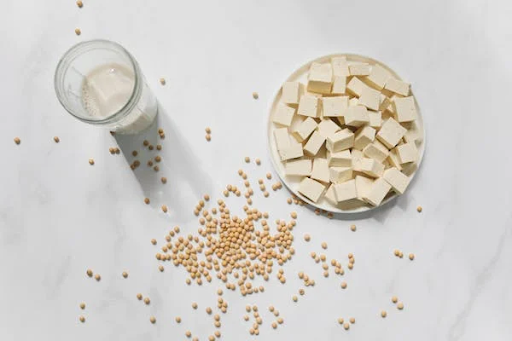PCOS & Diet: How food can help manage PCOS
PCOS is a common hormonal disorder that affects many women, encompassing a range of symptoms including irregular periods, weight fluctuations and fertility issues. There are many strategies to manage PCOS symptoms, and one that is sometimes overlooked is the effect of diet. The foods you consume can greatly affect your body, influencing hormone regulation, insulin sensitivity and your overall health.
In this blog post, we will delve into various aspects of your diet that may exacerbate or alleviate your PCOS symptoms.
Carbohydrates
Despite often being notoriously vilified in the media, carbohydrates are an essential nutrient that provide you with the necessary energy for daily tasks. Around half of our daily energy intakes should come from carbohydrate foods.
However, for those with PCOS, like you it may not be that simple. You may also have insulin resistance, where the body is unable to use insulin effectively leading to high levels of sugar circulating in the blood. These high levels of sugar in turn cause the pancreas to produce more insulin causing increased levels of insulin also circulating in the blood.
Because of this, you may have heard that going carb-free or even gluten-free is the best way to manage your PCOS - but is this true? Well once the evidence is weighed up, going carb-free or gluten-free is in fact not the best option - in addition it may even lead to nutrient deficiencies (fibre, iron, niacin, zinc, folate etc) and could cause other symptoms like carbohydrate cravings, mental fog, fatigue and headaches.
So what can you do instead?
Instead of cutting out carbohydrates, it is best to choose your carbs wisely!
Incorporating carbohydrate sources with a low glycaemic index (GI) is a better step to managing your PCOS symptoms than eliminating carbohydrate foods completely.
Low GI foods eg, beans, lentils, chickpeas, wholemeal pasta & rice, wholegrain bread and fruits & vegetables, are digested and absorbed at a lower rate, meaning blood sugar levels don’t spike rapidly, allowing more time for the body to release insulin - great for PCOS individuals with insulin resistance!
Protein
Protein is an essential nutrient that helps facilitate growth and repair, and can also provide energy to the body. It has the added benefit of keeping you full and satisfied for longer, stabilising cravings and blood sugar levels, which is great for PCOS individuals who commonly experience insulin resistance. Incorporating a variety of proteins, including plant-based proteins is key to optimise your health and manage PCOS symptoms.
Plant based proteins include:
Lentils
Beans
Mycoproteins
Tofu
Soy
If you’re struggling to include protein in your diet via food alone, then you may want to consider adding a protein powder to your diet. Protein powders can be animal or plant-based, with animal-based protein powders being more easily absorbed by the body. Choosing the ‘right’ protein powder doesn’t have to be difficult - consider the following factors and you will be good to go!
Choose a plant or animal-based protein powder based on your dietary preferences
Look at the number of artificial sweeteners it contains (there is evidence to suggest these may disrupt the microbiome, which may intensify PCOS symptoms)
Check the protein content - most powders are 20-30g of protein per scoop
Dairy
Dairy is great for providing many essential nutrients including calcium & B12, that support general health. You may have heard from online sources that dairy can be inflammatory and therefore it is best to go dairy free if you have PCOS as chronic inflammation is associated with PCOS. However, there is actually little evidence proving that dairy is inflammatory and so eliminating it completely from your diet is unlikely to be an effective way to manage your PCOS symptoms.
However, this will vary between individuals, and if you notice that your symptoms improve when you exclude dairy then you may wish to try a plant based milk as an alternative to milk. There are many different types of plant-based milks available and the best fit for you will depend on your personal need. For example, if you're trying to stay full for longer and reduce cravings then high protein milks such as pea or soy milk may be a good option for you.
Healthy fats
Fats are great to incorporate into your meals, alongside proteins, and carbohydrates.
Omega-3 fats are a group of healthy fats that have many benefits including anti-inflammatory effects, cardioprotective effects (reduce the risk of cardiovascular disease), maintain brain function and can help manage depression and anxiety. Furthermore, omega-3 fats have also been shown to reduce production of the sex hormone androgen, reduce blood pressure and promote regular ovulation - all great for managing PCOS symptoms!
Omega-3 fats cannot be made within the body and so it is necessary that you include them in your diet once to twice per week. Foods containing omega 3 are highlighted in the table below.
If you are unable to include these foods in your diet regularly, then you may wish to consider an omega 3 supplement.
Fibre & plant based foods
Fibre is essential to keep our gut microbiome (the bacteria that live in your intestinal tract) healthy and diverse - trying to include 30 different plant foods a week is a great way to incorporate fibre into your diet. The gut microbiome is like an organ with links and connections all around the body- a happy gut equals a healthy body! For those with PCOS, symptoms such as anxiety and depression, inflammation, fatigue and cravings can all be reduced by improving your gut health through eating plenty of fibre.
Fruit and vegetables are a great source of fibre and are packed with essential vitamins and minerals, keeping your body healthy and nourished in the long-term.
Plant-based diets, whether vegetarian, vegan or flexitarian can be a great way to add extra fibre to your diet and be really helpful in managing PCOS. Due to the range of foods eaten when having a high fibre and low GI plant-based diet, they have been shown to improve insulin resistance, microbiome diversity, inflammation, weight loss, fertility and even reduce the risk of chronic conditions.
Opting for a varied and balanced diet (even if you’re not fully plant-based every day) is key to tackling many of the common symptoms experienced with PCOS.
Alcohol
The combination of PCOS and alcohol may not be helpful in managing your symptoms - in fact it may be better to be mindful or reduce your alcohol content.
Alcohol has shown to cause large spikes in both blood sugar and insulin levels, disrupt sleep, interact with drugs such as metformin (a drug commonly given to manage PCOS & insulin resistance), increase mental health issues (heightened stress, anxiety, depression etc) and it may affect fertility.
However, cutting out alcohol completely isn’t always a feasible or popular option so instead you may wish to opt for small amounts of more PCOS friendly drinks that are low in sugar and contain antioxidants such as, clear liquor, red wine and white wine.
Coffee
Coffee is a drink enjoyed all around the world - but can it affect PCOS management? Although there is limited evidence specifically exploring the relationship between coffee and PCOS, some studies have shown positive effects that could benefit individuals with PCOS, including reduced insulin resistance, cardiovascular disease and stroke - this is due to the high polyphenol content in coffee.
However, the large caffeine levels may actually exacerbate insomnia, anxiety, high blood pressure and fertility issues that may already persist in those with PCOS. Due to this conflicting evidence, it is difficult to make any strong recommendations on coffee, and so a moderate approach is probably best.
Tea
Green tea however is packed with polyphenols (specifically catechins) with studies showing benefits such as reducing insulin resistance, weight management and balancing hormones. However many of these studies are small with inconclusive results and there are side effects of consuming too much, such as difficulty sleeping, headaches and stomach upset.
Spearmint tea is a herbal tea that many people use across the world as a natural ‘medication’. It has proven effects in reducing androgen (commonly known as ‘male sex hormones’) production, great for those with PCOS who tend to have naturally higher androgen levels (think testosterone), tackling symptoms such as hirsutism (excessive hair growth), hair loss and acne.
Therefore incorporating both green tea and spearmint tea can be great alternative hot drinks to coffee and a great way to support management of your PCOS, as long as you stay mindful of side effects and consuming too much.
Herbs and spices
Herbal medicines and spices are rising in popularity - especially in the treatment of hormonal imbalances and PCOS.
Cinnamon is a spice often described as a ‘miracle ingredient’ with many potential benefits for PCOS individuals, specifically for those with insulin resistance, high blood sugar, irregular periods and high cholesterol. It is a versatile ingredient that can be incorporated easily in both sweet and savoury dishes.Try and opt for ceylon cinnamon or stick to the recommended serving of 0.5-1 tsp per day to maximise benefits.
Turmeric is another spice commonly used in South Asian and Moroccan cuisine with powerful antioxidant and anti-inflammatory properties. Research also shows an association between curcumin (the active compound in turmeric) and improved outcomes in PCOS individuals. More research is needed however to understand what dosage is most beneficial for those with PCOS.
Similarly, ashwagandha is another useful herb with the potential to reduce and alleviate many symptoms of PCOS. Benefits of ashwagandha include
Improves immunity
Regulates hormones
Aids fertility
Supports stress management and sleep
Probiotics
Although the exact cause of PCOS is unknown, it is thought that an imbalanced gut microbiota may contribute to the onset of PCOS. Probiotics (live microorganisms that are beneficial to the gut) and prebiotics (plant-based fibres and carbohydrates) can be extremely helpful in increasing both the diversity and functioning of the gut and digestive system. To manage PCOS symptoms try and include food sources rich in pre/probiotics to ensure a harmonised and healthy gut.
Weight loss
You may have been told that weight loss is the key to managing your PCOS, but did you know that only focusing on weight loss may do more harm than good. As regulation of appetite is commonly impaired in individuals with PCOS, it is much more difficult to lose weight leading to yoyo-dieting and weight cycling which in the long term may even lead to higher insulin levels - not great considering the majority of people with PCOS also have insulin resistance.
Weight loss and dieting also has a knock on effect on mental health and the challenges faced by PCOS individuals may add to this and cause stress, anxiety, disordered eating and even depression. Additionally, fad diets are not the way to go as they are often extremely restrictive (leading to potential nutrient deficiencies) with an emphasis on over-exercising. Instead, making small sustainable changes focusing on which foods you can add to your diet that nourish your body and make you feel good is the best way to tackle your PCOS!
Supplements
Supplements can be great to top up on nutrients that you may be lacking from your diet, especially if you have PCOS. Vitamin D is a necessary supplement in the winter months if you live in the UK due to the limited sunlight. Similarly if taking metformin to tackle insulin resistance, vitamin B12 supplementation is key.
Other supplements that can be beneficial and support the management of PCOS include:
Inositol: may regulate testosterone production, lower high blood pressure/blood fat levels, improve egg quality and chances of conception
Omega-3: maintains cardiovascular health and reduces production of the sex hormone androgen
Folic acid: linked to higher conception rate and shorter conception period as well as increased chances of ovulation
Chromium picolinate: there is some research to suggest that chromium picolinate can affect insulin levels, blood sugar levels, period regulation and ovulation
Zinc: studies have found that individuals with PCOS tend to have lower zinc levels. ZInc plays a role in managing insulin levels, production of testosterone and regulation of blood fats.
Magnesium: may improve insulin resistance as well as reduce inflammation and VLDL cholesterol levels.
Melatonin: a hormone involved in the sleep-wake cycle that can be extremely useful in not only improving sleep quality but also reducing inflammation and improving egg quality/ fertility.
NAC: N-Acetylcysteine is an insulin sensitizer and so may be useful in tackling insulin resistance in PCOS.
It is important to note that there is limited research investigating the effects of such supplements (especially with dosages) on PCOS individuals and so always consult a dietitian or health care professional when adding any supplements to the diet.
Where to get further support
Now that you’ve read this blog, we want you to feel empowered to take control of your health and wellbeing by making informed nutrition choices.
If you’re looking for PCOS recipe inspirations, then look no further as we have recipes for breakfast, dinner and even snacks!
For further support why not check out the rest of our blogs or book a call with registered dietitian and specialist women’s health dietitian, Dr Claire Pettitt.
For a list of references please see the linked individual blog posts on the specific topic.







